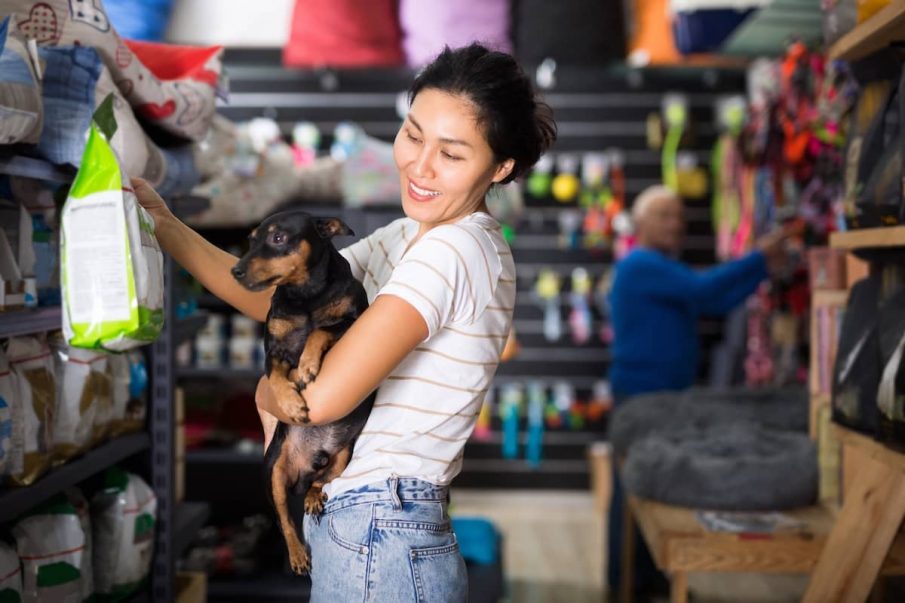Pets are expensive. It is a fact that feeding, housing and looking after a pet can get very expensive very fast. At the low end, it costs around £100 per month for a dog, but at the high end, it can cost up to £500 per month especially if your pooch goes to doggie daycare.
So, we had a chat with money.co.uk on their top tips for saving money on your pet. Also, if you are considering buying a dog or a cat, use the RSPCA’s pet calculator to see if you can afford it!
Lucinda O’Brien, money.co.uk savings accounts expert, said:
“Pets are part of the family, so it’s natural that we want to give them the best possible care.
However, pet expenses can quickly add up and this can put pressure on our finances, so it’s important to consider your budget and find ways to save money wherever possible.
Plus, April marks National Pet Month, so to celebrate our furry friends here are some of the ways pet owners can save money – from secondhand toy shopping to setting up a savings account for emergencies.”
Read more: Budgeting and Financing for Your New Puppy
1. Explore subscriptions
Pet food is an essential part of your animal’s wellbeing and once you find a diet that works, you’ll want to stick with it. However, the price of food can be expensive so explore whether there are ways to reduce the monthly cost.
Some pet food brands offer an online monthly subscription at a reduced cost. And you get the added benefit of it arriving on your doorstep so you’ll never run out.
2. Buy in bulk
If you can’t find a suitable subscription, try purchasing food and other essentials in bulk. Look for special deals if you buy in larger quantities and this will save you money over time. However, don’t forget to check use-by dates because you’ll need to make sure the purchases stay fresh for your pet.
3. Sign up for loyalty clubs
Pet shops are keen to reward their loyal customers, so many have set up loyalty clubs. For example, Pets at Home has a VIP Club which you can join for free and you’ll be rewarded with monthly vouchers and special offers on your pet’s birthday.
4. Compare prices
If you want to reduce the cost of your pet purchases, then it’s always good practice to compare prices. Start by comparing supermarket prices with those online and you’ll soon find a good deal. It might take a bit of research, but your hard work will be rewarded with some significant savings.

5. DIY grooming
Professional grooming can be expensive, especially if your pet requires regular grooming. However, you could learn how to groom your pet at home by watching online tutorials. You might need to invest in some grooming equipment, but this would still save you money over time.
If doing the entire grooming routine at home feels unrealistic, then try to do some basic grooming. For example, regularly brushing your dog’s fur or bathing your pet, as this could reduce the amount of visits you need to the groomer.
6. Make your own treats
Try and ignore the pressure to always buy new treats for your pet, and instead get creative. There are many recipes online for making your own animal treats and they normally involve basic ingredients. For example, a banana, natural peanut butter and oats can make a tasty dog treat.
7. Shop second hand
Another way to save money is to reduce the expense of buying new toys for our pets. Instead, look in charity shops for second-hand toys as these will be cheaper and still give your pet a lot of joy. However, remember to check that the toys are in good condition and safe for your animal to use.
8. Ask friends and family
If you need to buy something specifically for your pet – for example, a new crate or a carrier for the car – try asking your family and friends if they have one you could borrow. Sharing items like this can really help to reduce any unnecessary costs.
9. Schedule check-ups
Your pet’s health will be your number one priority, so it’s important to schedule check-ups with your local vet and stick to the yearly vaccinations. This will keep your pet healthy and prevent any costly health issues later in life.
10. Consider pet insurance
Speaking of vet appointments, if you are worried about any unexpected vet bills then it could be worth exploring pet insurance. There are different policies available, so do your research to find the right cover for your needs.
You may feel that it is an unnecessary expense when your pup is running around and happy with life. However, anything can happen that needs a trip to the vet and they are expensive without pet insurance.
11. Set up a savings pot
Finally, if you are able to save some money each month, then consider opening a savings account or setting up a new savings pot. This money can then be used for emergencies and it’ll give you peace of mind that if your pet needs help, you’ll have the money available.






